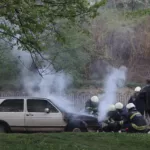The cost of gas is increasing regularly, making it challenging for many individuals to afford to fill up their vehicles. Whether you’re going to work, completing errands, or going on a trip, the cost of gas can accumulate rapidly.
Fortunately, there are strategies to save money on gas and prevent expensive fill-ups, even while on a road trip. knowing the factors that impact gas prices, suggestions for increasing fuel efficiency, and guidance for discovering the most reasonable gas prices will help you know how to save money on gas and avoid expensive fill-ups. So whether you’re an experienced road tripper or just trying to save money on your daily commute, here is a comprehensive guide that will equip you with the necessary tools to manage your gas expenses.
Know About Gasoline and Gas Prices
The first thing you should do when trying to figure out how to save money on gas and avoid expensive fill-ups would be to research gas and gas prices. Figure out the factors that impact gas prices, the different gas grades and octane ratings, and how well to utilize this information to save money on gas and avoid expensive fill-ups during your trip.
Factors Impacting Gas Prices
Gas prices are influenced by various factors, including:
- supply and demand. High demand often leads to an increase in prices, whereas low demand can cause prices to fall.
- Additionally, fluctuations in crude oil prices, which is a primary component of gasoline, can directly impact gas costs.
- Changes in the global economy, geopolitical events, and supply and demand can affect crude oil prices.
- Taxes on gasoline vary depending on location and can significantly impact gas prices.
- Political instability and unrest in major oil-producing countries can also contribute to the price fluctuations of gas.
What You Should Know About Gasoline Grades and Octane Ratings
Gasoline is categorized into different grades based on its octane rating, which measures its ability to resist “knocking” or “pinging” during combustion. Gasoline with higher octane ratings is less likely to cause engine knock. There are three main grades of gasoline: Regular (87 octanes), Mid-Grade (89 octanes), and Premium (91-94 octane). While higher-octane gasoline can provide better performance in some vehicles, it is also more expensive. Choosing the right gasoline grade for your vehicle based on the manufacturer’s recommendations is important to maximize fuel efficiency and avoid potential engine damage.
How to Plan Your Trip to Save Money on Gas
Before hitting the road, one of the things to add to the list when planning your road trip itineraries is how to save money on gas and avoid expensive fill-ups during your trip. This will go a long way toward making your trip successful and more effective. That way, you don’t have to worry about gas and how much money will be going into fill-ups. Here are some tips for planning your trip to save money on gas:
Selecting the Most Fuel-Efficient Route
Here are some tips for selecting the most fuel-efficient route that will help you save more on fuel and if you are traveling with other people, leave you with more money to engage in other roadside attractions and treat yourself to fun road trip activities with friends:
- Use apps before you begin the trip to find and note the most fuel-efficient route to take to save some money. Using GPS or mapping software is one of the best ways to plan a fuel-efficient route. These tools can calculate the most efficient route based on factors such as traffic, road conditions, and elevation changes.
- Another way to select fuel-saving routes is to avoid roads with heavy traffics and long detours. By avoiding heavy traffic and long detours, you can maintain your vehicle’s fuel efficiency and reduce the frequency of gas stops during your trip.
- It’s also important to consider factors like traffic, road conditions, and elevation changes when planning your route. Taking highways with minimal stops and high speeds is generally more fuel-efficient than scenic routes that pass through small towns with stop signs and traffic lights.
Sticking to the Speed Limit
Driving consistently at or below the speed limit can significantly improve your vehicle’s fuel efficiency. According to the US Department of Energy, driving at speeds above 60 mph can reduce fuel efficiency by up to 25%. When thinking about how to save money on gas during your road trip, it’s best to maintain a steady pace within the speed limit.
Avoiding Overpacking
Extra weight in your vehicle can reduce fuel efficiency and increase the frequency of gas stops. To improve your vehicle’s fuel efficiency, pack only the essentials and avoid overpacking. Additionally, keeping your trunk as empty as possible can help reduce the weight of your vehicle and maximize fuel efficiency, making it one of the best ways to save money on gas and avoid expensive fill-ups in the process.
By following these tips, you can plan a fuel-efficient road trip and figure out ways to save money on gas and avoid expensive fill-ups along the way.
How to Save Money on Gas During the Trip
When you are in transit, you may need to have some tips up your sleeves to save you some money and avoid expensive fill-ups by this, you increase your chances of utilizing your road trip itineraries effectively and save more money on enjoying some other fun things to do on a trip. So here is how to save money on gas and avoid expensive fill-ups during the trip; while in transit.
Finding the Cheapest Gas Stations
Using gas price comparison apps and websites can help you find the cheapest gas stations along your route. This can help you save money on gas and avoid overpriced fill-ups.
Taking Advantage of Fuel Rewards Programs
Many gas stations and credit card companies offer fuel rewards programs that allow you to earn discounts or cash back on gas purchases. Be on the lookout for these programs and take advantage of them. This can help you save money on gas and make your road trip more affordable.
Paying with Cash or Debit
Paying for gas with cash or a debit card can help you avoid credit card fees and take advantage of cash discounts offered by some gas stations. This can help you save money on gas and reduce your overall travel expenses.
Using Fuel-Efficient Driving Techniques
Smooth acceleration and braking, avoiding aggressive driving, and using cruise control on the highway can all help improve fuel efficiency and reduce the amount of gas you use. This can help you save money on gas and reduce the frequency of fill-ups during your road trip.
Taking Regular Breaks
Taking regular breaks during your road trip can help reduce fatigue and improve your driving experience. By taking advantage of rest stops and scenic overlooks, you can stretch your legs, take in the scenery, and give your vehicle a break, which can help you improve fuel efficiency and serve as one of the ways to save money on gas and avoid expensive fill-ups.
How to Avoid Expensive Fill-Ups
You know you don’t really have to buy fuel when the prices are quite high. You can actually save a lot of money if you plan your fuel refilling for the right time. Here are some tips to help you save money on gas and avoid expensive fill-ups that could help you achieve this.
Knowing the Best Times to Purchase Gas
Avoid filling up on weekends and holidays, when gas prices are typically higher, and instead, fill up during the week when possible even before your trip.
Staying updated on gas prices in your area to determine the best time to purchase gas and avoid costly fill-ups.
Finding the Cheapest Gas Stations
Conducting online research to find the least expensive gas stations in your area and planning your stops accordingly.
Asking for recommendations from friends and family on where to find the cheapest gas prices.
Planning Ahead to Benefit from the Lowest Prices
Planning your stops in advance can help you take advantage of the cheapest gas prices along your route, preventing costly fill-ups and saving money on gas during your road trip. Remember to check prices frequently since they can fluctuate throughout the day.
Conclusion
Various tips on how to save money on gas and avoid expensive fill-ups during your road trip have been provided here. These include avoiding weekends and holidays, monitoring gas prices in your area, researching prices online, asking for recommendations, planning your stops in advance, using fuel-efficient driving techniques, paying with cash or debit cards, and taking advantage of fuel-saving apps and websites.
Fuel expenses can quickly add up during road trips, and it’s crucial to be mindful of your expenses to avoid overspending. By following the tips outlined in this article, you can make your road trip more affordable and enjoyable.
These tips are simple to follow and can make a significant difference in your budget. So, take the time to implement these tips and see the difference they make in your fuel expenses. Not only will it help you to know how to save money on gas and avoid expensive fill-ups, but you’ll also have more money to spend on other activities during your trip. Therefore, start planning your road trip today and make the most of your budget!



























